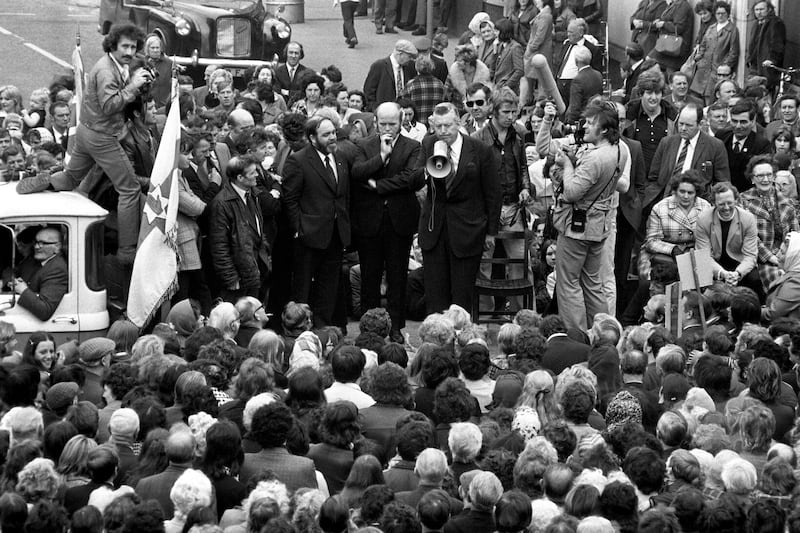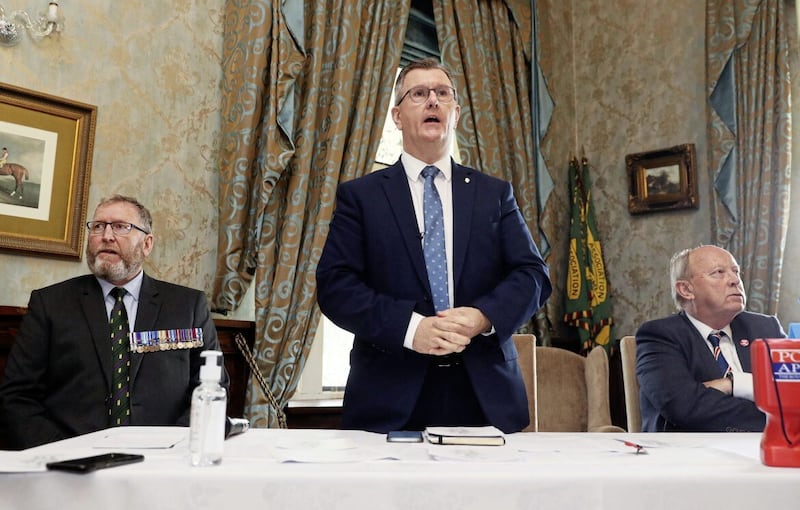March 8 1973 was, according to Brian Faulkner, the first good news day for unionism since the prorogation of the NI Parliament a year earlier.
A border poll – albeit boycotted by nationalism – confirmed 57.4% support for ‘NI to remain part of the UK’. Unionism welcomed the result and Secretary of State William Whitelaw promised that both the result and the wishes of the majority would be respected.
Yet less than two weeks later, on March 20, unionism was down in the doldrums again with the publication of a White Paper by the UK government. It’s main proposals included a new assembly (elected by PR), a Secretary of State remaining in office, control of security matters staying with Westminster; and the setting up of a Council of Ireland. Mindful of the border poll, there was a reaffirmation that NI would remain part of the UK for so long as a majority wished it.

While Faulkner’s UUP took a reasonably relaxed approach to the proposals, a new loyalist group (embracing Vanguard, the DUP and representatives of the UDA, Orange Order, Loyalist Association of Workers and some smaller factions of unionism/loyalism) rejected the White Paper and promised a campaign to ‘inform the people about the truth’ of the proposals. Craig and Paisley both warned that a Council of Ireland, even if it was intended solely for north-south discussions on ‘relevant’ matters, would become a vehicle for eventual unity.
The Sunningdale deal nine months later seemed to confirm their fears about a formalised Council of Ireland – particularly in the new power-sharing arrangements at Stormont – and this time the majority of the UUP agreed with them. Within a matter of weeks, the loyalist anti-White Paper protest group had morphed into the United Ulster Unionist Council which was to bring down Faulkner, Sunningdale and the assembly itself.

The presence of the Council of Ireland in both the White Paper and the Sunningdale Communique worried unionism/loyalism for another reason. They feared it was the thin edge of a more serious attempt by the UK government to rid itself of what Vanguard leader William Craig described as ‘their Northern Ireland problem’. Mind you, I’m not sure he gave any consideration to the possibility that his very inflammatory language in the run-up to prorogation, and afterwards, might have played a part in the government’s calculations.
The UK has changed since 1920 and it will continue to change. Barking at the moon is not a change-stopping strategy: it is just howling for the sake of it
But it was clearly at the forefront of unionist concerns. On January 13 1974, Ian Paisley told RTÉ that he supported a plebiscite of the British people because “I am convinced that the British Government does not want us. I am absolutely sure”. On the same day Sam Smyth, a senior UDA member, used an article in the Sunday News to support an ‘independent socialist state’, along with the suggestion that NI should be ruled by a non-sectarian military junta for five years.
A week later Paisley repeated his call for the UK Government to hold a referendum on NI’s constitutional status: “Then the people of Ulster would know assuredly where we stood with the rest of the citizens of the UK. If that came, I could not see the way ahead by an amalgamated Ireland. But I could see the way ahead by an independent Ulster.”

And shortly afterwards Harry West, Faulkner’s successor as leader of the UUP, told RTÉ he would not be shocked by a British declaration of intent to withdraw: “If it wants to break the link we will have to assess the whole situation again and it could be that we will be faced with the alternatives of joining in a united Ireland or running an independent show in Ulster.”
Meanwhile, Desmond Boal, a former chair of the DUP and former Stormont MP for the UUP had floated the idea of a federal Ireland: “I would now consider a federal Irish parliament holding the kind of powers which were formally reserved to Westminster under the 1920 Act together with a provincial parliament holding the powers formally held by Stormont.” Even though Paisley and Craig rejected the suggestion, it was another example of a number of ‘post-NI in the United Kingdom’ options which were being discussed openly – sometimes more privately – across unionism and loyalism.

Echoes of those fears and conversations about British intentions 50 years ago can be heard right now. Indeed, to some extent the Windsor Framework and sea border have become the equivalents of the Council of Ireland and Sunningdale Communique in fuelling the narrative that a British government is still finding ways to push NI out of the UK. But this time the conversations about alternatives are much more limited, not least because, unlike May 1974, there aren’t hundreds of thousands prepared to support the strike and protests that wrecked UK policy back then.
I’ve noted before that unionism’s fear of betrayal from outsiders (Westminster, Dublin, EU and ‘liberal’ media) and insiders (Lundies) cripples its ability to agree on either short-term or long-term strategy. The fear also leads to serial division because lack of coherent long-term option preparation leads to silo mentality and accusations of surrender, rollover or cave-in levelled among the various competing factions.

Fear is the most destabilising factor in dealing with a political or ideological crisis. And yet fear is the platform upon which the original Ulster Unionist Council was established in 1905: fear that all of Ireland would be removed from the then Union of Great Britain and Ireland.
Fear was the basis on which the UUP governed NI from 1921-1972: fear that it would be outnumbered from within and betrayed from without. Fear is what led to the collapse of and chaos within unionism from 1972 to 1998: fear that the United We Stand glue would morph into a Divided We Fell reality.


And fear continues to dominate most of unionism: fear that unity of purpose is now impossible and that demographics are pushing only one way.
The only way to dilute that fear is to accept that there will be change and that it has to be managed. Unionism can continue to bicker and break apart, or it can sit down, talk to its collective parts and parcels and find better ways to protect and promote its primary interests.
The UK has changed since 1920 and it will continue to change. Barking at the moon is not a change-stopping strategy: it is just howling for the sake of it. Unionism has changed since 1972 and will continue to change. So, one thing is certain: acknowledge and adapt to that certainty or die on an isolated rock of its own making.




